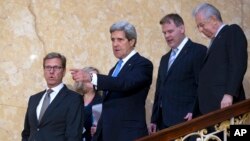LONDON —
Foreign ministers of the Group of Eight industrialized countries, which includes Russia, have threatened “further significant measures” if North Korea conducts another missile launch or nuclear test in defiance of U.N. Security Council resolutions. North Korea is expected to launch a new medium-range missile sometime soon.
The chairman of the foreign ministers’ group, British Foreign Secretary William Hague, spoke for the group after their meeting.
“Ministers supported the commitment to strengthen the current sanctions regime and take further significant measures in the event of a further launch or nuclear test by the DPRK,” said Hague.
Hague made clear the threat refers to further sanctions, not military action. But he noted all the countries, including Russia, agreed to say they condemn North Korea’s nuclear and missile programs “in the strongest possible terms.”
There was not such unanimity on Syria, where Hague acknowledged that Russia, and China, which does not belong to the Group of Eight, continue to oppose stronger international action. He said there was no breakthrough on that during the London meeting, but he said it is important to keep talking, and to move forward on humanitarian help and non-lethal support for the Syrian opposition.
But he had harsh words for the international community’s overall effort on Syria.
“On Syria, the world has failed, so far, in its responsibilities and continues to do so, as the United Nations Security Council - as I said in parliament the last time we discussed this - has not fulfilled its responsibilities,” he said.
Hague said the diplomatic process is “deadlocked” because Russia and China have twice vetoed stronger Security Council resolutions, and likely would do so again.
He said he believes that if nothing changes, there will be a “strong case” to ease or lift the EU arms embargo on the Syrian conflict, when it comes up for renewal next month. He said Syria “is on track to be the biggest humanitarian catastrophe of the 21st century, so far.”
The dispute with Iran over its nuclear program also was high on the ministers’ agenda. Hague called last week’s talks in Kazakhstan “disappointing,” and said Iran’s position “falls short of what is needed” to achieve progress. He declined to say how long the six negotiating countries would allow the talks to continue, but he acknowledged they may have to wait until after the Iranian presidential election in June.
“This will become the time in which in the E3+3 we really decide whether the Iranians really mean it or not, to pursue meaningful negotiations,” he said.
Hague said Iran will have to decide “this year” whether it really wants a negotiated settlement. Iran says its nuclear program is for peaceful purposes, but many countries believe it is aimed at building a nuclear weapon. There is concern that if sanctions and diplomacy do not convince Iran’s leaders to stop enriching uranium and allow inspections, the United States or Israel might take military action.
The chairman of the foreign ministers’ group, British Foreign Secretary William Hague, spoke for the group after their meeting.
“Ministers supported the commitment to strengthen the current sanctions regime and take further significant measures in the event of a further launch or nuclear test by the DPRK,” said Hague.
Hague made clear the threat refers to further sanctions, not military action. But he noted all the countries, including Russia, agreed to say they condemn North Korea’s nuclear and missile programs “in the strongest possible terms.”
There was not such unanimity on Syria, where Hague acknowledged that Russia, and China, which does not belong to the Group of Eight, continue to oppose stronger international action. He said there was no breakthrough on that during the London meeting, but he said it is important to keep talking, and to move forward on humanitarian help and non-lethal support for the Syrian opposition.
But he had harsh words for the international community’s overall effort on Syria.
“On Syria, the world has failed, so far, in its responsibilities and continues to do so, as the United Nations Security Council - as I said in parliament the last time we discussed this - has not fulfilled its responsibilities,” he said.
Hague said the diplomatic process is “deadlocked” because Russia and China have twice vetoed stronger Security Council resolutions, and likely would do so again.
He said he believes that if nothing changes, there will be a “strong case” to ease or lift the EU arms embargo on the Syrian conflict, when it comes up for renewal next month. He said Syria “is on track to be the biggest humanitarian catastrophe of the 21st century, so far.”
The dispute with Iran over its nuclear program also was high on the ministers’ agenda. Hague called last week’s talks in Kazakhstan “disappointing,” and said Iran’s position “falls short of what is needed” to achieve progress. He declined to say how long the six negotiating countries would allow the talks to continue, but he acknowledged they may have to wait until after the Iranian presidential election in June.
“This will become the time in which in the E3+3 we really decide whether the Iranians really mean it or not, to pursue meaningful negotiations,” he said.
Hague said Iran will have to decide “this year” whether it really wants a negotiated settlement. Iran says its nuclear program is for peaceful purposes, but many countries believe it is aimed at building a nuclear weapon. There is concern that if sanctions and diplomacy do not convince Iran’s leaders to stop enriching uranium and allow inspections, the United States or Israel might take military action.




